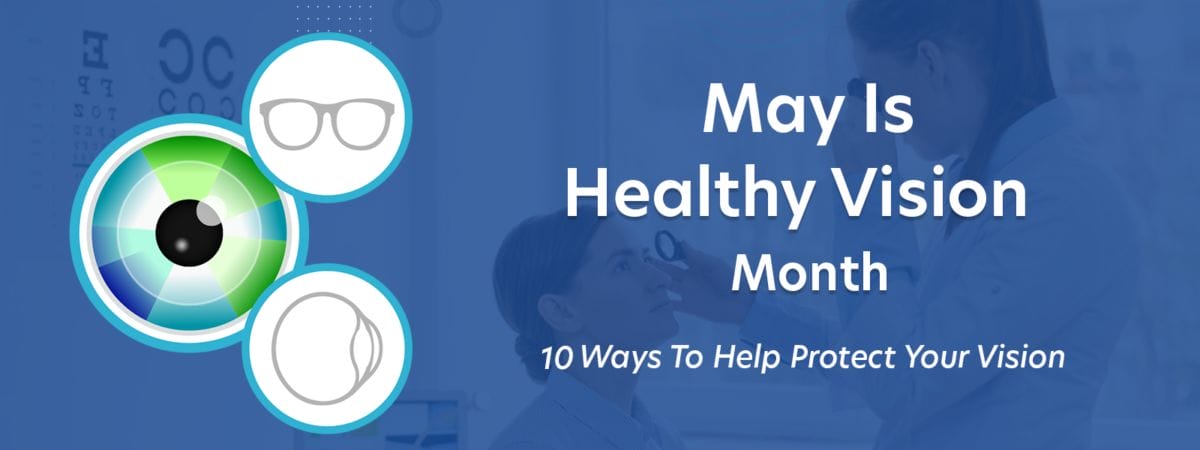May Is Healthy Vision Month: Tips for Protecting Your Eyes

May month is devoted to raising awareness of eye health issues, which includes preventive measures that help individuals optimize their vision, empowering them to safeguard their eyes and live a happy life. During Healthy Vision Month, we want to share with you some of the most effective tips for protecting your vision. So, let us begin without wasting any time.
Schedule regular dilated comprehensive eye exams
For most Americans, absence of symptoms means good eye health, which is not always the case. Some eye issues, such as age-related macular degeneration, do not exhibit any warning signs but can lead to irreversible vision problems. So, it’s vital to prioritize regular dilated comprehensive eye exams as they help in the early detection of eye issues and help save vision.
Know your family eye health history
People who have a family history of eye diseases such as glaucoma are more likely to develop the disease. So, one should research about their family’s eye health history. And tell their ophthalmologist/optometrist about the disease that runs in their family. This may prompt the health care professional/ eye doctor to advise the individual to take more frequent eye exams. Because eye tests help doctors monitor their patient’s eye conditions and provide them with timely treatment, preventing vision loss.
Eat the right food to protect your eyesight
Food plays a vital role in maintaining good eye health, and some foods that are great for the eyes are green leafy vegetables such as spinach, kale, and collard green. This food contains antioxidants that help protect the eyes from the sun’s ultraviolet light and also reduce the risk of eye diseases. Similarly, fish such as salmon and tuna are high in omega-3 fatty acids, which are excellent for eye health.
Maintain a healthy weight
You might not know, but weight and eye health are closely related to each other. For example, obesity escalates the risk of developing type 2 diabetes, which causes eye issues such as diabetic retinopathy. It also leads to open-angle glaucoma, which causes irreversible blindness, and the same is the case with high blood pressure, which leads to hypertensive retinopathy. So, do regular exercise or be physically active to keep a healthy weight.
Wear protective eye gear for sporting and doing home activities/hobbies
Sports and various other activities can lead to eye injuries. Like while playing baseball or basketball, flying objects can enter and damage your eyes. Similarly, activities, such as painting and yard work, expose you to debris, dust, and chemicals that can harm your eyes. So ensure you wear protective gear while playing sports or doing any other activity.
Quit smoking or don’t smoke
Studies say that smokers are four to five times more likely to develop eye diseases. This is because smoking is directly connected to high blood pressure, cataracts, and diabetes. So, if you smoke, consider reducing (slowly you will be successful in quitting smoking altogether), and if you don’t smoke, avoid it at any cost to protect your eyes and your overall health.
Wear sunglasses that block 99% UVA and UVB
Try to avoid exposing your eyes to sunlight, which contains ultraviolet light. However, if you have to go under the sun, don’t forget to wear sunglasses that give 99% protection from UVA and UVB. This is because prolonged exposure to ultraviolet light can lead to eye conditions such as Cataracts and Pterygium.
Adhere to contact lens hygiene
Contact lens hygiene plays a crucial role in preventing complications, such as eye infection, irritation, and discomfort. By following proper hygiene practices such as washing hands with soap before applying lenses and cleaning and disinfecting lenses properly, you can protect your eyes from conjunctivitis and other eye-related issues that are caused by bacteria and contaminants.
Practice workplace eye safety
Protective eyewear such as safety glasses, goggles, or face shields do a remarkable job of saving your eyes from hazards in the workplace, which can be anything from chemicals to debris. So, don’t think about leaving them at home, and if you happen to forget them, call someone to bring them to you at your workplace.
Follow the 20-20-20 rule
If you think your eyes are safe, simply because your work is on the computer, it’s time to open your mind. Looking at a computer screen for long hours leads to issues such as dryness, blurred vision, and headaches. One of the best ways to reduce these symptoms is to follow the 20-20-20 rule in which, after every 20 minutes, one has to take a 20-second break and look at something that is 20 feet away. This is an effective technique for relaxing the eyes and reducing digital eye strain.
Final words
Use “May is Healthy Vision Month” as a reminder to focus on maintaining good eye health. But don’t forget that your eyes need care every day and month, not only in May. Always give priority to your eyes and add these practices into your daily life to protect your vision.

